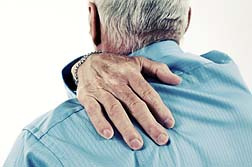 Meanwhile, research published in the May edition of The Journal of Bone & Joint Surgery, suggests that a post-operative pain pump might not be necessary at all. The researchers involved recommend that surgeons not use post-surgical pain pumps following arthroscopic surgery of the knee because there are other methods of managing the pain that are just as effective as the pain pumps but without the potential negative effects.
Meanwhile, research published in the May edition of The Journal of Bone & Joint Surgery, suggests that a post-operative pain pump might not be necessary at all. The researchers involved recommend that surgeons not use post-surgical pain pumps following arthroscopic surgery of the knee because there are other methods of managing the pain that are just as effective as the pain pumps but without the potential negative effects.Researchers wrote, "Infiltration of bupivacaine around the portals had an equivalent effect on pain scores at one hour and we would therefore recommend this technique to avoid the possible chondrotoxic effect of intra-articular bupivacaine." In plain language, this means that researchers found that the use of injections of the anesthetic solution [bupivacaine] was just as effective at reducing pain as the pain pump was but without the same potential for complications.
The researchers addressed these negative effects in the opening to their study, noting "Recent evidence has suggested that bupivacaine may be harmful to articular cartilage."
At least 1 study has shown that patients who used the pain pump following shoulder surgery are at a higher risk of a condition known as Postarthroscopic Glenohumeral Chondrolysis (PAGCL). A study, published in the Journal of Bone & Joint Surgery in 2008, studied the effects of bupivacaine on chondrocytes (the cells found in cartilage). Researchers found that prolonged exposure to 0.5 percent and 0.25 percent bupivacaine solutions are "potentially chondrotoxic," that is, potentially toxic to the cartilage cells.
In 2006, the American Academy of Orthopedic Surgeons reported that the use of post-operative pain pumps may be associated with PAGCL.
Postarthroscopic Glenohumeral Chondrolysis is a serious condition that can cause severe pain in patients. The condition is marked by a progressive loss of the cartilage in the shoulder joint, causing great pain for patients. The cartilage in that joint allows the shoulder and arm to move smoothly. People suffering from the condition say they have great difficulty moving the affected arm and shoulder.
READ MORE SHOULDER PAIN PUMP LEGAL NEWS
Darlene S. describes the pain in her shoulder as, "[It] feels like a hot poker trying to get out the front of my shoulder. [I have] trouble sleeping, driving, doing housework and my yard and gardening [are] on hold."
While much of the focus regarding post-operative pain pumps has focused on shoulder surgeries, the May 2009, study suggests that there is the potential for harm in patients who were given the pain pump following knee surgery. This means that there may be patients who had knee surgery and have a great deal of pain in that knee, not necessarily from the surgery but from the use of a pain pump afterwards.
